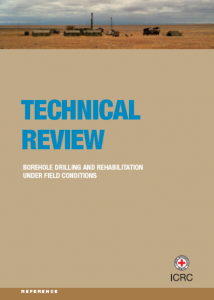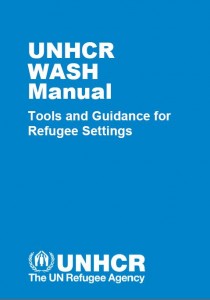 |
UNHCR Global Strategy for Public Health 2014 – 2018 (UNHCR, 2014)
This document describes UNHCR’s global strategy for public health through a set of guiding principles and strategic approaches including protection; age, gender and diversity; equity; access; sustainability; community empowerment; appropriateness and reliability; partnerships and coordination; capacity building; communication and advocacy; integrated approaches; measurement and monitoring; and innovation. The document describes strategic objectives and enabling actions per sub-sector (Public Health, HIV and Reproductive Health, Food Security and Nutrition, and WASH).
|
 |
Emergency Sanitation (WEDC, 2002)
The book Emergency Sanitation: Assessment and programme design has been produced to assist those involved in planning and implementing emergency sanitation programmes. The main focus of the book is a systematic and structured approach to assessment and programme design. It provides a balance between the hardware (technical) and software (socio-cultural, institutional) aspects of sanitation programmes, and links short-term emergency response to long-term sustainability. The book is relevant to a wide range of emergency situations, including both natural and conflict-induced disasters, and open and closed settings. It is suitable for field technicians, engineers and hygiene promoters, as well as staff at agency headquarters.
|
 |
Emergency Water Sources (WEDC, 1997)
These guidelines have been designed to help those involved in the assessment of emergency water sources to collect relevant information in a systematic way, to use this information to select a source or sources and to determine the appropriate level of treatment required to make the water suitable for drinking.
|
 |
Borehole Drilling and Rehabilitation Under Field Conditions (ICRC, 2011)
Constructing, or repairing, boreholes requires specialized knowledge and technical expertise, much of which can be gained from the standard literature; but field operations in remote areas or in difficult conditions often require flexibility and imagination in avoiding and solving technical problems. This review is intended as a decision-making tool to assist in making cost-effective choices between borehole drilling methods, and in deciding whether to drill new boreholes or rehabilitate existing sites.
|
 |
Practical Guidelines for Test Pumping in Water Wells (ICRC)
Pumping tests are a practical way of obtaining an idea of the borehole’s efficiency and its optimal production yield. Much of the specialized knowledge and technical expertise needed for this purpose can be gained from the standard literature. However, field operations in remote areas or in difficult conditions often require flexibility and imagination in avoiding or solving technical problems. These guidelines are intended mainly as a practical tool and
therefore contain a minimum of theory. They are aimed at water and habitat engineers working in the field who are undertaking or supervising borehole drilling or rehabilitation
programmes and are not conversant with pumping test procedures.
|
 |
Sphere Minimum Standards and Indicators for Humanitarian Response (SPHERE, 2011)
The Sphere Handbook is one of the most widely known and internationally recognized sets of common principles and universal minimum standards for the delivery of quality humanitarian response.
|
 |
UNHCR WASH Manual – Preliminary Version (UNHCR, 2015)
The UNHCR WASH Manual is a comprehensive and authoritative reference document for WASH interventions in refugee settings, built upon the experience of UNHCR and WASH organisations.
Tags: Accès pour Handicapés, Accès pour Handicapés, Approvisionnement en Eau, Approvisionnement en Eau, Approvisionnement en Eau, Approvisionnement en Eau, Approvisionnement en Eau, Approvisionnement en Eau, Assainissement Total Piloté Par La Communauté, Camions Citerne, Camions Citerne, Changement de Comportement en Matière d'Hygiène, Collecte des Eaux de Pluie, Collecte des Eaux de Pluie, Compostage des Excréta, Compostage des Excréta, Contrôle des Maladies Transmissibles, Contrôle et Suivi de la Qualité de l'Eau, Contrôle et Suivi de la Qualité de l'Eau, Contrôle et Suivi de la Qualité de l'Eau, Coordination EHA, Coordination EHA, Coordination EHA, Diarrhée Aqueuse, Diarrhée Sanglante, Douches, Douches, Droit à l'eau / assainissement, Droit à l'eau / assainissement, Droit à l'eau / assainissement, Écoulement des Eaux, Écoulement des Eaux, Égouts et Acheminement des Excréta, Égouts et Acheminement des Excréta, Élimination des Eaux Usées, Élimination des Eaux Usées, Évaluations EHA, Évaluations EHA, Évaluations EHA, Évaluations EHA, Forages, Forages, Forages, Forages, Genre, Genre, Genre, Gestion de l'Hygiène Menstruelle, Gestion de l'Hygiène Menstruelle, Gestion de Programmes EHA, Gestion de Programmes EHA, Gestion de Programmes EHA, Gestion de Programmes EHA, Gestion des Décharges, Gestion des Déchets Médicaux, Gestion des Déchets Solides, Gestion des Déchets Solides, Gestion des Excréta, Gestion des Excréta, Gestion des Excréta, Gestion des Excréta, Installations Adaptées aux Enfants, Installations pour la Lessive, Installations pour la Lessive, Lavage des Mains au Savon, Lavage des Mains au Savon, Lutte Antivectorielle, Lutte Antivectorielle, Lutte Antivectorielle, Malaria, Plans pour la Sécurité en Eau, Plans pour la Sécurité en Eau, Plans pour la Sécurité en Eau, Pompage d'Eau, Pompage d'Eau, Pompage d'Eau, Pompage d'Eau, Pompe Manuelle, Pompe Manuelle, Pompe Manuelle, Prospection d'Eau, Prospection d'Eau, Prospection d'Eau, Prospection d'Eau, Protection, Protection, Protection, Protection des Sources, Protection des Sources, Puits Creusés à la Main, Puits Creusés à la Main, Puits Forés, Puits Forés, Puits Forés, Puits Forés, Recyclage, Réutilisation et Réduction des Déchets, Réseaux d'Adduction d'Eau, Réseaux d'Adduction d'Eau, Réseaux d'Adduction d'Eau, Réutilisation des Excréta / Urine, Réutilisation des Excréta / Urine, Santé et Sécurité, Santé Publique, Santé Publique, Santé Publique, Sensibilisation à l'Hygiène, Sensibilisation à l'Hygiène, Sensibilisation à l'Hygiène, Stockage de l'Eau, Stockage de l'Eau, Suivi et Evaluation EHA, Suivi et Evaluation EHA, Suivi et Evaluation EHA, Suivi et Evaluation EHA, Suivi et Evaluation EHA, Thèmes Transversaux, Thèmes Transversaux, Toilettes Communautaires, Toilettes Communautaires, Toilettes Communautaires, Toilettes Familiales, Toilettes Familiales, Traitement de l'Eau, Traitement de l'Eau, Traitement de l'Eau au Ménage, Traitement de l'Eau au Ménage, Traitement de l'Eau au Ménage, Traitement des Excréments, Traitement des Excréments, Vidange et Transport d'Excréta, and Vidange et Transport d'Excréta. Languages: Anglais, Anglais, Anglais, Anglais, Anglais, and Anglais. Organisations: UNHCR and UNHCR. Categories: Documents de Référence EHA, Documents de Référence EHA, Documents de Référence EHA, Documents de Référence EHA, Documents de Référence EHA, Documents de Référence EHA, and Documents de Référence EHA.
|